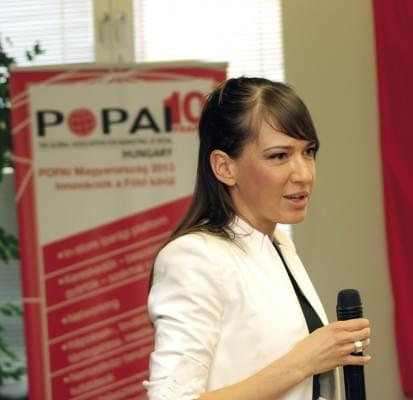Positive trends
In April the Trade Marketing Club invited the representatives of market research companies to look back on 2013, and to talk about the latest survey results and trends in the FMCG sector. Gabriella Mile, business development manager of Nielsen told that consumer confidence was growing: it was at 41 points in Q2, at 45 points in Q3 and at 51 points in Q4 2013. ‘Attractive and exciting discounts and promotions’ remained one of the top 5 store choice factors. Hungarians were the third most promotion-sensitive consumers (29 percent switch from their favourite store to another for a good promotion) from the 19 countries surveyed by Nielsen. Ms Mile also called club members’ attention to the fact that retailers can find many ways to satisfy consumer demand, offering comfortable shopping conditions, a wide selection of products and a good price/value ratio, and added that successful innovation can create competition advantage for manufacturers. The next speaker was Rita Vella, client service director of GfK. She started out by saying that the first two months of 2014 were very good in FMCG sales as households spent nearly 7 percent more on these goods than in the first two months of 2013. Shopping frequency dropped to 282 occasions in 2013 but the average spending per occasion grew to HUF 2,500. Economic recession restructured consumption preferences – people purchased less, downgraded and quit buying certain categories. Obviously these trends influenced retail’s structure as well, small and specialist shops and discounters slightly improved their positions, while hypermarkets lost some of their market share. Ms Vella told that good promotional prices and shop proximity are the two most important store choice factors in Hungary. The share of ‘B’ brands form sales kept growing in 2013, because they were cheaper than ‘A’ brands but represented better quality than private label products. Shoppers are increasingly conscious, 66 percent don’t like when the store interior is rearranged frequently, 44 percent write shopping lists and 42 study the promotional leaflets of the store before they go shopping. Norbert Hovanyecz, managing director of SuperShop Kft. started his presentation by telling that SuperShop is the domestic market leader among multibrand loyalty programmes. In the years of recession SuperShop partners used added value instead of price discounts to reward customers, and this way they managed to avoid damage to their brands’ image and equity. SuperShop’s database also shows that the number of small-value shopping occasions is growing in small shops. Consumer spending is getting more and more polarised, and the significance of TOP buyers is increasing. In 2012 SuperShop launched a unique IT innovation, the EXTRA SuperShop coupon that facilitates making customised offers to card holders. In 2013 the company introduced a mobile NFC-based service. The last few years proved that besides good prices shoppers also focus on other benefits. The SuperShop programme can be used to reward consumers and this is likely to make them more loyal to stores or retail chains. SuperShop builds a long-term relationship between conscious customers and brands. András Szőcs, customer experience manager of TESCO Hungary called attention to the rapidly changing consumers and consumption habits. Consumers demand more and more form brands and they want to know more about the companies behind them. At the same time they believe other consumers more than the messages of advertisements. The concept of loyalty is also changing: these days it is brands that have to spot and reward loyalty. This is what Tesco does with the ClubCard programme, in which the proportion of coupons used reached 15 percent by December 2013. In the UK the retail chain has already introduced the digital ClubCard. Customers can be involved to a greater extent with the help of the digital ClubCard and it makes tailor-made communication possible. People can use their smartphones to check their coupons, loyalty points and Tesco’s personalised offers. Tesco Hungary also pays attention to the basics, making their stores as comfortable places of shopping as possible, where shopping is a real experience.
Related news
Related news
The Christmas season is starting earlier and earlier: value for money is the key
This year, 40 percent of Hungarians brought their Christmas shopping…
Read more >They want it to be premium, but also sustainable – expectations of the youngest generation
GlobalData’s latest report, “Demographics in Retail and Apparel” – which…
Read more >In six months, consumers donated 100 million forints to charitable causes through the mandatory redemption system
Through the deposit bottle return system, which began six months…
Read more >






